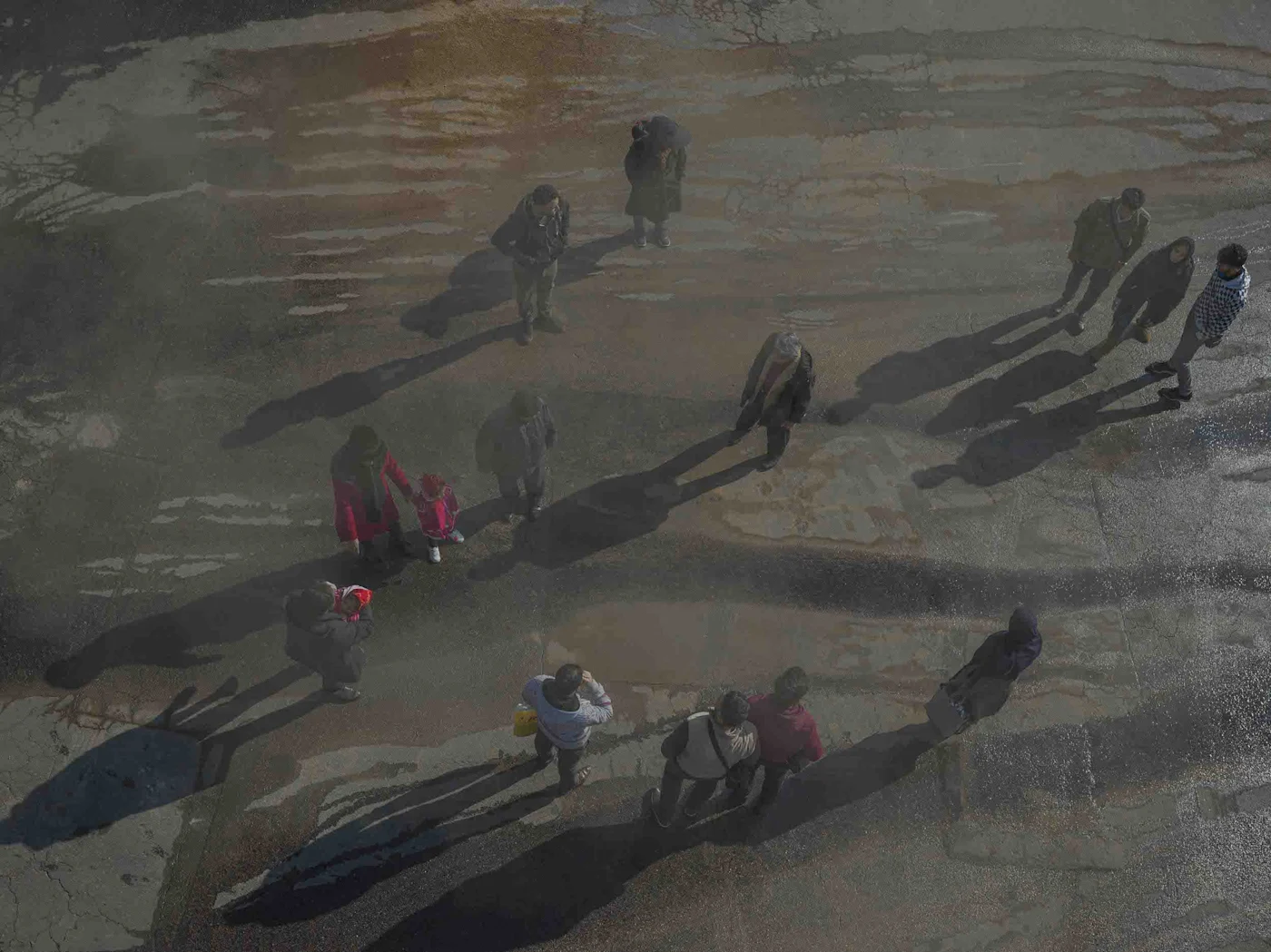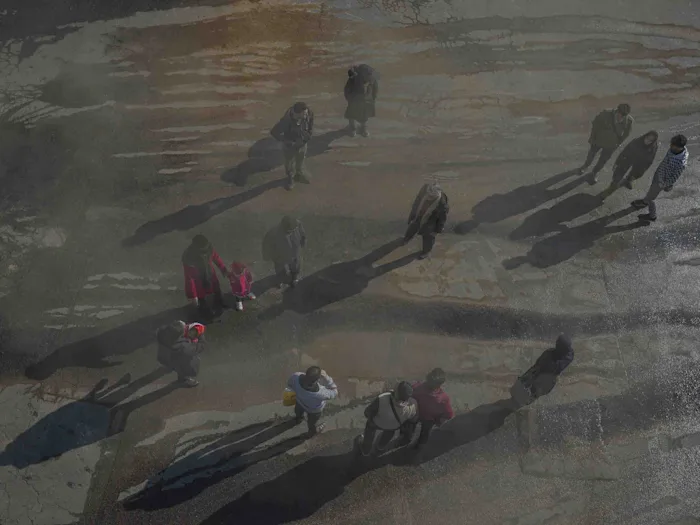Without Why: The Existential A Priori of Destituent Action
Michele Garau
Other languages: Italiano
"For an entire civilization, the hybris of principles has lost its credibility." —Reiner Schürmann
"In other words, with all the gravity of the case, and not without pain: destruction of the category of the universal." —Maurice Blanchot
That we are living through the twilight of the principial economies means that we inhabit an epoch in which the absence of meaning or essential footholds is the general condition. For this same reason, "to decide" upon this epoch requires that we welcome the historical possibility of shedding the “will” as we customarily understand it: a will not to will, which refrains from holding events within a fixed framework, from making them constant, from imposing upon them full transparency and permanent presence. In short, it demands that we not arrest the blossoming, the flow, of pure “physis.”
To reverse our detachment from worldly being, to overturn the domineering relationship of calculation by which the Western subject secures its grasp on the emergence of things, means to expose oneself to a “risk” without protection. This is precisely how Heidegger describes the poetic attitude, in his celebrated 1946 article on Hölderlin and Rilke.1 For Heidegger, Gelassenheit means to invert our estrangement from experience into a detachment from the self that guards and objectifies it, to abandon ourselves in order to let the world be. According to Reiner Schürmann's interpretation, this attitude of "letting-be" corresponds to the third and final trajectory of Heideggerian thought, known as the "topology of being." Here one abandonment is led to encounter another abandonment, one flow follows another, to the point of becoming indiscernible. For those familiar with Schürmann's thought, this approach belongs alongside the discovery of "epochal economies," which it also radicalizes. After historicizing the series of "Firsts" — those referents of legitimation that govern and mark the different "aletheiological configurations" of Western metaphysics, serving not only as founding figures of truth or archai, but also as "formal structures of power" and principles of command — what follows is a pure transcendental of taking-place [aver luogo], of the event and of free action in an "anarchic" economy, beyond metaphysics.2 On the one hand, this succession is a systematic one relative to Heidegger's thought; but it is also "destinal," because it can only come to the surface and let itself be evoked at a given moment in the "history of being," the most "impoverished" and risky moment, the one in which technology and nihilism draw metaphysics out into the open and expose it to its own decay.
According to Schürmann, it is precisely the ontological features of this third phase of Heidegger's thought that allow us to measure the distance between his anarchic "deconstruction" and Foucault's "archaeological" method, which is limited to the sphere of discursive regimes, historical a priori’s, or "epistemes" (it thus remains at the stage of epochal economies, but without fully developing its intrinsic ontological scope).3 These reflections on the "economies of presence" contain at least two elements of importance for the theory of destituent action. First, where the theoretical deconstruction of principles is concerned, to think without why has as its "existential a priori"4 a life without why. This is a directly Eckhartian5 current in Schürmann's thought: only those who live in a detached way can access the path of detachment. As Tiqqun observes:
And, indeed, what point could there be in the event, in striking out meanings, and in ruining their systematic correlations for those who have not carried out the ek-static conversion of attention? What could letting-be mean, the destruction of what stands between us and things, for those who have never noticed the solicitation of the world? How could they understand the existence-without-why of the world, those who are incapable of living without reasons? Will we be strong and numerous enough in the coming insurrection to create rhythms that prevent apparatuses from forming again, from assimilating that which in fact happens?6
It is in this intractable tension between life and discourse that we find the powerful dividing line that separates the materialism of presence from every metaphysics of the subject, including that within the history of revolutionary thought. This tension, as well as the possible coincidence associated with it, has little to do with any sort of dialectical relation. Foucault alludes to something similar in an interview delivered in Japan in 1970, in which he speaks of the "violent vertigo" that seizes him when he is faced with the possibility of stopping writing.7
The second point of note concerns the "political" consequences of these assumptions. We must depart from the premise that, in every given age or historical moment, the political domain itself is that region or field of action in which the functioning of the "Firsts,” those orders of meaning around which every sphere of civilization is articulated, is most visible. Every principle of legitimation, whether this be divine authority, "Reason," "Historical Progress," or some other worldview, functions in a threefold way as origin, as principle of reason, and as an instance of authority: Ursprung, archē, principium. A cohesive referent operates not only as the firmament that tethers words, actions and things in their mutual historical presence, it also provides the basis for an arrangement of power. By implication, a form of political action capable of responding to the decay of the epochal economies and the rise of anarchic ones (i.e., to the "turning") must contend with the definitive closure of all universal and totalizing justifications of power:
The first philosophies furnished power with its formal structures. More precisely, "metaphysics" designates that disposition where action requires a principle to which words, things and deeds can be related. In the age of the turning, when presence as ultimate identity turns into presencing as irreducible difference, action appears without principle.8
With respect to the categories of political action, the shift to be made depends upon the deconstruction of what Schürmann describes as the "teleocratic" or "archeo-teleocratic" circularity between ends and causes which, in his hand-to-hand combat with Heidegger, will draw him back to the very beginnings of Western philosophy in Aristotle's Physics.9 It leads back, in order words, to that opening to pure difference, to the absolute multiplicity of the event before it is reduced to the capture of representation, to "constant presence," or where politics is concerned, to the institution. By displacing action outside of every “pros hen” structure that would compel it to orient and project itself toward an external unity of meaning, or towards origins and ends, Schürmann invites us to think a type of action that is unjustified, at the same time as it is unconsolidated into the stability of an immutable subject (the "Subject" according to this interpretation is precisely the last hegemonic principle): an action "without why,"10 in which the origin [Ursprung], understood as the pure singularity of what occurs, as what comes into presence “here and now,” is separated from any archē [Anfang]:
Whatever the outcome of the street confrontations, insurrection has always-already torn holes in the tight fabric of beliefs that enable government to be exercised. This is why those in a hurry to bury the insurrection don’t waste their time trying to mend the broken foundation in crumbs of an already invalidated legitimacy. [...] To make the destitution irreversible, therefore, we must begin by abandoning our own legitimacy. We have to give up the idea that one makes the revolution in the name of something, that there’s a fundamentally just and innocent entity which the revolutionary forces would have the task of representing. One doesn’t bring the power back down to earth in order to raise oneself above the heavens.11
As the totality of what is thinkable and expressible by language, the frame and efficacy of an epochal constellation emerges only when that epoch has come to an end, that is, in the precarious moments of caesura, in the aleatory instability that emerges between the decomposition of an order and a new founding act. Conversely, the epochal architecture as a whole, and behind this the structure of "coming into presence" as a transcendental and trans-historical condition of all figures of power, in which their principled origin and their phenomenal contingency resides, becomes evident only in moments when a major "Turn" is underway.


Where politics is concerned, its legitimating referents are also suspended in brief yet precise historically localizable moments of interlude between one order and another, in which the indeterminacy of free action come into the open: openly distancing himself from Heidegger's evaluations, Schürmann cites the Commune of 1871, the soviets of 1905 and 1917, or the German council republics of 1918. However, what is most interesting is the fact that, firstly, by terminating the sequence of principles, with the "Turn” there is a gap that is no longer transient or relative but concerns the very scaffolding of the institution; and secondly, there is the explicit invocation of the necessity, in order to set the negative conditions for a free and pluralized sequence of liberated action, for the process of deconstruction to have an active and offensive edge, in order that the authoritarian immobilization of presence in the representations is counteracted, pushed into its decline:
The open field of manifestation — first called Dasein, then "epoch of truth" — is that in which any phenomenon "always already" appears. But it must be expressly set free, which requires certain conditions. What, then, has obstructed the self-liberation of freedom? Any representation of a metaphysical first. It follows that deconstruction is complete only as a struggle against epochal principles, the principes that reign and the principia that order.12
Deconstruction must confront those principles that continue to be upheld in their decline, those laws that remain in force without any significance, i.e., in their most catastrophic forms. Such a plexus of insights corroborates, beyond the author's own political assessments, the idea that a destituent motif traces a shadow across all past revolutionary events, like their unfinished but omnipresent reflection. It also indicates, to borrow a suggestion from the Invisible Committee, that a division or a break must be introduced inside the very idea of insurrection, as well as within its historical legacy. The pages Maurice Blanchot's dedicates to the May 1968 uprising offer a shining example for how we might begin to identify this destituent vocation, and give it a writing of its own. In tones in which Heidegger’s influence is easily recognizable, Blanchot’s The Unavowable Community (1984) underlines this coexistence of presence and absence, a giving of the event that is never complete, stable, accomplished once and for all, but always ready to retreat into the shadows from which it comes. A "pure presence," he states, that precisely because it is such, i.e., without any founding attributes, presuppositions or identities that inform its contours and delimit its access, is always also an absence, something never fully available for comprehension or integration. A "virtual exchange," Blanchot says, between common presence and absence, in which the only people that materializes therein is one of friendships, committees, and informal groups.13 This liminal experience of the "unstructurable," of an aleatory outside that manifests itself without ever being fully attainable, and which must therefore always be prolonged and renewed, emerging each time in its phenomenal contingency, was already evoked some years prior in a writing on 1968 produced from within the unfolding of events, entitled “Affirming the rupture”:
Taking on this rupture involves not only extricating, or trying to extricate, forces that tend toward rupture from their integration into established society but also acting so that in reality and each time that it is exercised, without ceasing to be an active refusal, refusal is not merely a negative moment. Politically and philosophically, this is one of the most important features of the movement. (...) The theoretical [task] obviously does not consist in elaborating a program or a platform but, on the contrary, outside off any programmatic project and even any project, in maintaining a refusal that affirms, in releasing or maintaining an affirmation that does not come to any arrangement but that undoes arrangements, even its own, since it is related to dis-arrangement or disarray or even the nonstructurable.14
It is curious to note that the aspects on which Blanchot dwells are roughly the same as those by which Colectivo Situaciones sought to isolate, in the Argentine uprisings of 2001, the features of a "new type of insurrection." Whereas most leftist observers stigmatized the rejection of representation and of the institutional terrain more broadly as a lack of "positivity" on the part of the movement, these Argentine researchers saw this as its most original trait. Its "subjectless" existence, which alludes to a "positive No," allows an empty space to emerge in which, instead of political programs, the ethical and situational nature of revolt insinuates itself. It is in this interweaving between a baseline opacity (of causes as much as of the agents) anchored in a circuit of cooperative and autonomous realities ("alternative socializations," the authors say) that the destituent vocation of the insurrection appears. The recurrent figure of the commune and its explosive, intensive communication, nourishes the affirmation of refusal: if a political qualifier exists, therefore, it lies not in a further dialectical passage beyond the fleeting experience of the uprising, but rather within revolt itself, in the "we" without premises that takes shape there. Think of the desperate obstinacy with which old and new political representatives spasmodically chase after the precipitation of struggles, their becoming, in order to try to extract from them some permanent sedimentation from which they can profit. Think of the strenuous quest of all those activists and aspiring spokesmen who try to push events to fit into their preferred predefined political forms, in order to extract their own identities from them. It’s clear just how much metaphysics persists in the reflections passed down from the champions of antagonist militancy. The case of the Yellow Vests in France is almost ridiculously exemplary, given the grotesque way in which so many, having ignored the novelty of the whole thing, struggled to ventriloquize through them, and to keep alive a shell that they have now finally finished abusing and cast aside. I will be forgiven for the clumsy and impressionistic application of austere philosophical concepts to such trivial matters, but the pattern is always the same everywhere. Even the book Piqueteros is not entirely exempt from this tendency.15
The historical dislocation that today deposes the figure of the "Subject" is the same one that undermines any linear and coherent planning, held together by a connective dimension inherent in the objectivity of causes, which once made it possible to pick out clear relationships of determination within the unleashing of social movements. As Tronti argued a few years back, if metropolitan revolts make their appearance in the new millennium as a destituent force, this is precisely because there is a lack of any conscious agent with its own vision, of the sort in which modern politics found its foundation. As Tronti has argued since La politica al tramonto, modernity is the history of the political because it is the story of subjectivity, its increasingly more collective and powerful becoming, of which the "labor movement" was the last great and failed incarnation. The crisis of the workers' movement is therefore, in the last instance, a crisis of the political as such, of modernity and of the "Subject" itself, in one and the same "tragic" historical passage.
This lack is first elaborated by "Colectivo Situaciones," although in a confused and contradictory way. The thread of their narrative surrounding the days of the 2001 uprising in Buenos Aires connects the disappearance of the centrality of the worker and of the workers' movement, as the last historical mode of political emancipation that centers on a "molar" form of subjectivity — i.e., one that formulates its own partisan aspirations in terms of its historical universality — to the crisis of the subject as a whole, and to that of the political as a global constituent project. However, unlike in Tronti, in the hints contained in these theses the tone of the discourse is not pessimistic but aims at embracing the potential of this crisis, its liberating character, as the "Invisible Committee" will do later and more effectively: the absence of fixed points of reference, the disorientation and death of "Politics," in short, are not taken as an irreparable defeat, but rather as a factual starting point, and even as a weapon.
The fragmentary and evental intensity of revolt, as a moment of conflict without any political transcendence, incapable of a horizon of development like those we have seen in the history of socialisms of the 20th century, depends upon these factors; the impossibility of a historical totalization that would pass through the generalization of a subject and use it as a support point, the disappearance of any access to "totality" as we have known it — to the general interest, the universal, the common — this is what the category of "destituent power" attempts to translate and interrogate. These elements thus cease to be simply referred to negativity and lack, as if the revolts were an abortion of historical reason, a dead end, in order to seek the "how" of a different political consistency having its own specific causality.
For example, in a remarkable passage, Colectivo Situaciones emphasizes the operation of the interplay of heterogeneous causes that converge in the uprising which, at a certain point, condense and reach a "point of fusion." What is most significant and topical in these texts is the way in which the many experiences, memories of oppression, reasons for anger and "layers of time" that are interwoven in the struggle not only do not unify around a hegemonic signifier, the hierarchical articulation of a unitary rhythm that would still be that of the classical political project; yet neither do they continue to wander according to a random and acentric pattern. There is no quantitative accumulation that, piece by piece, reaches a qualitative threshold that reverses or transforms the discontent in revolt, making the whole thing bubble over, nor can we locate a determining cause of a structural kind, according to the schemas of a recently revamped Marxism. Instead, there is a confused composition [composizione magmatica] of disjointed and separate reasons and minor discontents that, at a certain point, and according to an opaque but concrete and material dynamic, join up and become "causes," making normality no longer bearable even for another day.


It is important to reiterate that, when taken in themselves and before the event of the revolt took place on December 19 and 20, 2001, none of these memories and instances of redemption constituted a valid cause: not the restructuring of the labor market and the oppressive policies of the "International Monetary Fund," not even the erosion of public services or the episodes of ruthless repression by the police, which resulted in the killing of two demonstrators. At a certain point, however, with the declaration of a state of siege, and after several days of looting supermarkets in the poor neighborhoods of the capital, these isolated sufferings crystalize into a constellation and explode, without warning:
In any case, it was not an "accumulation" in the mechanical and deterministic sense, according to which, after arriving at a certain point, a single straw — say the state of siege — breaks the camel’s back. Taken separately, none of these dissimilar memories can be understood as a cause, for they only act as such once they have entered into the dynamic that actualizes them. The point of fusion, at which each convergent element loses its solid state in order to fuse with each other, giving way to a new consistency, did indeed occur around the state of siege.16
Destitution therefore also names that mechanism that deactivates temporalities and causal regimes, the codes that, in the past, allowed one to decipher the movements of struggle, to predict and explain their motivations. In this way, multiple temporalities are liberated, the "fibers of time"17 that lie beneath the crust of a capitalist domain that acts precisely by absorbing the chronological fragmentation of experiences into the regulatory framework of a single, abstract, spatialized time. It is these fragmentary experiences and "worlds" that contemporary struggles serve to reopen. In fact, according to the philosopher Bernard Aspe, every authentic "collective" — philosophical, artistic, but above all a political collective of a revolutionary kind — takes shape through the affirmation of a "common time" which, in order to flourish, must escape the synchronization apparatus of the economy and capitalist synthesis.
So long as the boundary of individual existence remains limited to the private isolation of subjective time, so long as every intensive, lived and concrete connection to the times of others is annulled, the only foothold for organizing our existence lies in the reference to abstract time. For Aspe, it is the alliance between the private time of, let's say ‘daily activities,’ and that of abstract time that prevents the formation of shared times: I am so isolated in my personal time that I have no connection except to the clock face. In this sense, the work of "synchronization" between discordant times becomes a function monopolized by capitalism, expropriated from our spectrum of existential, and hence political, capacities. The world of economic domination is the time that imposes itself on all others, the extraneous and artificial articulation of multiple temporalities:
Contemporary capitalism depends upon the articulation between the empty form of clock time and the disparate multiplicity of temporalities that the latter subsumes. In other words, it rests on a monopoly of synchronization that remains external to the processes and activities whose coordination it makes possible. This synchronicity does not occur solely through the ticking of the clock, even if this continues to epitomize the primary resource of capitalism. This synchronicity also occurs through the necessity imposed on all of us to remain in sync with the evolution of the apparatuses of communication by means of which the space of planetary synchronicity is deployed.18
The destituent violence of uprisings unleashes these previously bridled and compressed plural temporalities, it gives them a chance not only to manifest themselves, but also, consequently, to harmonize and resonate with one another, to break out of their autistic isolation, without being reduced to a pure cacophony. As the Invisible Committee writes in a suggestive passage, the way revolt expands and mutates into a revolutionary dynamic does not resemble a forest fire, since its ‘contagion’ does not follow a linear chronological process that, however rapid, would be continuous and gradual; rather, there are moments of resonance and vibration that connect distant places through a rhythmic correspondence that has something "musical" about it:
Revolutionary movements do not spread by contamination but by resonance. Something that is constituted here resonates with the shock wave emitted by something over there. A body that resonates does so according to its own mode. An insurrection is not like a plague or a forest fire — a linear process which spreads from place to place after an initial spark. It rather takes the shape of a music, whose focal points, though dispersed in time and space, succeed in imposing the rhythm of their own vibrations, always taking on more density. To the point that any return to normal is no longer desirable or even imaginable.19
In 2001, Tiqqun had already observed evocatively that, "in a sense, the revolutionary question is now a musical one."20
The dynamics of today’s uprisings, of the "riots" but also of the autonomous zones, of the blockades and of the occupations of habitable places that have appeared in recent cycles of struggles — certainly in the Argentine one — together with the episodes of clashes, are thus restored to their own regime of rationality and historical determination, eschewing those catastrophic or nostalgic postures that tend to strip them of their contents. It can be said, paraphrasing Sylvain Lazarus, that in the politicality of these revolts, of direct action and of the new destituent grammars of contemporary antagonism, we witness a "saturation" and not merely a cancellation of the previous "historical modes of emancipation"21: between the old and the new there is as much an absolute discontinuity of languages, practices, and methods as there is a paradoxical continuity that transmutes and reframes the same subterranean questions, straining their lexicon and overstepping their limits. Even if there is no longer any trace of the various watchwords that once sustained the vocabulary of the revolutionary tradition — project, class, party, revolution — the problems persist, since the political "sites" to which these terms responded have simply been displaced elsewhere and transposed into something else, rendering them unrecognizable.
As we noted already, destitution is a shadow and an unsolved problem that courses throughout the entire history of revolutionary movements, particularly insofar as the pivotal defect of so many defeated revolutions lay in their incapacity to carry over the opening of the revolt as an event — the ecstatic laceration of the historical continuum — into the duration of revolution as a process. A variety of philosophical texts exist to remind us that wherever we encounter coupled or binary machines (whose poles are always presented, illusorily, as if they were initially unrelated), these must be broken, profaned. In fact, the entire problem of cultivating and delineating an "outside," the real revolutionary question of our time, surfaces within this complex of concepts, and must contend with the operation of the apparatuses, with their "thresholds of politicization" and, therefore, with the controversial and undecidable relationship that binds limit and transgression therein. Foucault's writings on literature, on Bataille, Blanchot, Roussel, but also on the ‘lives of infamous men’ who make their appearance in the archives, concern precisely this dynamic, in which the crossing of liminal points carries with it and projects ahead of it the border that it simultaneously violates.22
The conceptual and political fallout of this evidence consists in the configuration of the outside as a fold, a hollow of the inside. For if the subject is an encrustation of the devices of power, gaining an outside means widening and holding open as much as possible the gap that is created between the breakdown of subjection — desubjectification — and the redefinition of the subjective frame, for example in the representations of politics. Here resides a field of tension and a notable aporia of Foucauldian research, since one touches the frontier of the diagram formed by powers, a void excavated within them, not in some locatable space. This is the problem of the intersection of ethics and politics, of "counter-conducts" and forms of life: can one perform operations upon individual existence that maintain a vacuum of "desubjectification" large enough not to fall immediately into the field of influence of the government and its network of subjugation? Can this otherness be effective and spread, communicating with the repertoire of politics, albeit in an original and unprecedented sense?


Revisiting revolutionary history has, therefore, an eminently practical meaning: to locate those embryos of political and material autonomy, with a strategic view to a systemic upheaval. To depart from what is nearby, from the situated and perceptible, but not in order to withdraw from what constitutes the background: neither a revival of the old political paradigms, therefore, nor a private retreat to the islands of a tolerated and compatible alternative; neither the old revolutionary dreams, nor the inoffensive niches of neoliberal "self-care." Herein lies the programmatic significance of the division, already evoked, within the very idea of insurrection: is the destituent core of past subversive temperaments detachable from their relapse into the uninterrupted cyclical nature of power arrangements? The fact that Agamben makes a terminological shift, in two writings that are more or less of the same period, is significant. In a 2013 speech, Vers une théorie de la puissance destituante, during a seminar held in France under the title Défaire l'Occident, he expresses precisely the need to think about conflict and violence in other terms, emphasizing the risk, for contemporary struggles, of fully falling back into the patterns of the past:
We have always seen revolutions occur like this: we have a violence that goes on to constitute rights, new laws, and then a new constituted power that takes its place. Whereas if we were able to think of a purely destituent power, we would perhaps succeed in breaking this dialectic between constituent power and constituted power which was, as you know, the tragedy of the Revolution. This is what happened, and we can see it everywhere even now, for example in the revolutions of the Arab Spring. Immediately, constituent assemblies are convened, and these are followed by something still worse than what existed before (...). This forces us to elaborate a completely different strategy. For example, when we think of violence, this violence must be purely destituent. We must be careful, for if it is a violence that goes on to constitute a new right, we have lost. We have to think the concepts of revolution and insurrection in another way, which is not easy.23
On the other hand, in the epilogue to The Use of Bodies — entitled “Toward a Theory of Destituent Power” — which to a large extent constitutes a re-elaboration of the intervention just mentioned, Agamben claims that, whereas to constituent power there "corresponds revolutions, revolts and new constitutions,"24 this is to say, a violence that posits law, a destituent power must find entirely new strategies. This is a non-negligible shift of emphasis that testifies to the complexity of this point in question, touching on the deepest political relevance of the idea of destitution.
The definition of "political spirituality" alludes to that ethical nature, that adherence to the integrality of a collective form of life, without which there is no way out of the critical impasses just identified. It is an idea employed by Foucault throughout his interventions surrounding the Iranian revolution in the late 1970s. This detail is significant, even if the validity of the intuition goes beyond the controversial developments of the event and the debates that followed it.25 The possibility of a revolt that codifies its aspirations outside the ideological grammar, political programs, and the Western vision of subjectivity is essential here: the popular rebellion can be anchored to a general vision of existence, to an imaginary and a historical rationality different from those of European modernity. It is not the specific case of Shiite Islam that is important here, but rather the singular relationship that is established between the operation upon subjectivity, the breaking of political subjugation, and the possibility of a broader social extension of "counter-conducts." In the complex and unresolved relationship that Foucault traces between an aesthetics of conduct, of "ethico-poetic" styles26, and social conflict, there is a clear identification of an extreme limit of the political as we know it, out of which emerges an issue that today's anti-capitalist perspectives cannot ignore. It is indeed the "outside as the hollow of the inside," as Vaccaro says, paraphrasing Foucault. If revolutionary aspirations have always had a link — more or less secularized — to eschatology and its experience of time, to the point that their distinct souls can be parsed on the basis of their corresponding perception of temporality that corresponds, inevitably, to a certain "spirituality," it is evident that the field of politics, today, no longer responds to this question.


More precisely, the need we are talking about is an effect, an immediate appeal that the horizon of change addresses to the life of the subject, to his condition and to his daily choices. The call to put an end to the world as it is cannot disregard, in other words, the concrete possibility, here and now, of living differently against it, whether or not this possibility is embodied in an already developed community:
Religious eschatology constitutes the positive, affirmative content of that uprising which is not only a rejection of the existing regime, which does not even concern a political organization, but is first and foremost a collective perception: the claim to another world in this world, that is, to another way of life. This spiritual experience makes such an uprising irreducible to struggles against domination (the struggle against American imperialism) and struggles against exploitation (the class struggle) alike.27
For this reason, alternative social constructions that experiment with other forms of life and self-determination are of more than merely "technical" value (trying out material and organizational structures), since they also have an ethical significance that comes with conferring consistency on the call in question: they form "counter-subjectifications," which can be resolved either into individual dominations, or else become plural and communitarian. The universality of the West has always been affected by centrifugal offensives on the part of subtractive collectivities, and it continues to be so today: think of the otherness lying behind the unitary fiction of citizenship, the irrevocable partiality beneath the transparent neutralization of biopolitical networks, the intensive outside harbored within the flattened integration of all difference. The pages of Tiqqun’s Introduction to Civil War — in which Elias and the concept of the "curialization of warriors" are taken up, offer an accurate depiction of the process by which the "Great Outside" (crime, transgression, abnormality, and workers' revolution) and the Inside collapse on each other, which eventually compels us to think the Outside within the transparent biopolitical tissue, as a point of opacity in subjects and bodies. This is perhaps the only thread that holds together a long tradition of the oppressed, made up of fragments and discontinuous scenes, ranging from Anabaptism to the dawn of the communist movement.
The peculiarity that Foucault attributes to the Iranian case, its dependence on a shared ethos and perception, in fact, is not entirely absent from the broader spectrum of revolutionary struggles. As Frédéric Rambeau points out, this detail does not escape Foucault when he explores, in The Hermeneutics of the Subject and The Courage of Truth, the relationship between revolutionary militancy and the phenomenon of conversion, as the exercise of a radical renewal of the subject:
And finally, we should not forget that from the nineteenth century the notion of conversion was introduced into thought, practice, experience, and political life in a spectacular and we can even say dramatic way. One day the history of what could be called revolutionary subjectivity should be written. [...] It seems to me that we cannot understand the revolutionary individual and what revolutionary experience meant for him, unless we take into account the notion or fundamental schema of conversion to the revolution.28
A "militantism in the world and against the world,"29 Foucault states, an other life for another world, which substantiates "the scandal of revolutionary life as a scandal of truth."30 In the rest of the anticolonial, working class and communist struggles, it does not seem that the effect on conducts is any less powerful than what we find in religious phenomena, nor does it bring with it the demarcation of a biographical divide [la delimitazione di uno spartiacque biografico]. Indeed, Foucault presents nihilist, anarchist, and communist movements, including even contemporaneous "gauchistes" groups and the origins (in the 1920s) of the French Communist Party itself as examples of a militancy that is also a way of life, expressions of an unacceptable, dangerous truth. However, it seems that Foucault considers the link between the scandalous truth of conversion and the overall field of political strategy as a precarious one, assimilated tout court to the institutionalization of the party and the apparatus. At base, there is therefore a tension and a dichotomy between the dynamics of the evasion from subjection, of "desubjectification" and of techniques of the self — by their nature impolitic, aesthetic and ethical, or linked to the religious imaginary that is the glue to the Iranian uprising — and, on the other hand, the forms of revolutionary political organization that spanned 19th and 20th centuries. The history of the communist parties would be paradigmatic here, as it traces a period of development that leads from the subjective exception of conducts that manifests itself stubbornly in an aesthetic of existence, and forms of life in rupture with what is commonly accepted, only to be degraded and reabsorbed into a conformist acceptance of social norms. The mark of revolutionary politics throughout European history in its entirety lies in this neutralization of the sense of militancy:
The scandal of revolutionary life — as a form of life which, breaking with all accepted life, reveals the truth and bears witness to it — is now inverted in these institutional structures of the French Communist Party, [with] the implementation of accepted values, customary behaviour, and traditional schemas of conduct [...] One can imagine quite well what this analysis of the style of life in European revolutionary movements [might entail], and, however important it could be to make this analysis. So far as I know, it has never been done: how the idea of a cynicism of revolutionary life as a scandal of an unacceptable truth clashes with the definition of a conformity of existence as the condition of militantism in the so-called revolutionary parties.31
In The Hermeneutics of the Subject Foucault writes again: "We would also have to see […] how we passed from belonging to the revolution through the schema of conversion, to belonging to the revolution by adherence to a party.”32 In short, it seems that when the full coincidence between the identity of subjects and the apparatuses of power is broken, when a relative "outside" is actually reached, a threshold of extraneousness from government, there enters into play dimensions that escape politics, being transcendent and ulterior to it. There is a "possible politics" that escapes both subjugation and that "government of the self" which, it is worth remembering, Foucault always associates, in his analyses of classical Greece, with an optimal model of the government of others, of the conduct of souls and bodies. It is not by chance that, at the beginning of his final seminar, Foucault declares that he wants to return to the origins of those practices of truth and constitution of the subject that typically form around confession, passing through the different forms of the piloting of consciousness, and on up to pastoral power and its modern derivations in medical and political control. Both a militancy in which the institution has replaced truth, and a retreat to self-care as the encrustation of disciplines and powers, carrying the discourse to its final conclusion, now appear problematic, confirming that wherever a binary machine is arrayed, it is most likely a question of destroying it:
The force of the interruption tends to open a heterotopic space within the disciplinary and governmental topos, in order to play the mobile threshold of the outside as a hollow of the inside from which to continue the radical excess of meaning and imagination with respect to the boundaries of the politicum possible. The inheritance of the cynics, along a historical path in which obviously conditions and contexts of meaning have changed, is assumed by the radical dissident, by the revolutionary bearer of a new world in his own heart, and not only carrier of a particular ideological analysis of the world or of a political project. If parrhesia declines the saying-the-true also in the aesthetic sense of existence, that is, as a visible prefiguration, as a worldly and non-transcendental testimony of a different organization of society, then "the revolution functioned as a principle that produced a certain way of life…”33
The fact that Foucault speaks, however, of a "political spirituality" — both in his writings on the Iranian revolution as well as in his last course of 1984, The Courage of Truth — and that he places conversion at the origin of revolutionary militancy, once again as a transfiguration of the subject, shows how the distinction between the different fields is far from being linear and definitive. It is also interesting to note how Rancière identifies, during his more Foucauldian phase — that of La nuit des proletaires and the journal Les revoltes logiques — a double face of past revolutionary experiences: there is the overtly political side of collective demands, and there is another one, linked to experience and perceptions, which sees many "worker philosophers," artisans and manual workers, poured into activities they are not deputized to perform, which transform their symbolic and material universe, such as those of self-education and art. The two poles are not identified, but neither are they completely disjointed.


What is certain, however, is that whereas in the great classical movements of social transformation there was a relevant space for the overall involvement of in/dividual life, none of the ethical evidence, feelings, or existential conditions expressed in contemporary uprisings are resolvable into the forms of political representation. As the Invisible Committee observes, one of the novel features of the uprisings that have erupted repeatedly in the West in recent years is that they depend primarily on ethical evidences and truths, and not on programs, ideological grammars, identities, or claims. Within this new frame, however, there is no explicit mediation by any sort of codified spiritual imaginary, but only a sudden and fragile subjectification — therefore also and above all a "desubjectification," an escape from the network of identities — that is given in a singular and experiential way, according to unexpected circumstances.
As is easily seen in the case of the Yellow Vests, or in the peripheral riots of the banlieues and racial ghettos, a "disidentification" that does not really subjectify anything statically defined is not easily recuperated within the circuits of traditional politics and constituted power, as happened with the Iranian revolution or, in a completely different context, in the outcome of the "Arab Springs." At the same time, its ethical affirmations are even less distinguishable, since they resist any effort to fix them in a congealed time.
The contributions that appear in this magazine [Qui e Ora] often touch on such points, for if we speak of spirituality, contemplation, autonomy, we are alluding to something that has to do with conduct, that places itself in an outside, that wants to profane this unbreakable division that, as a continuously perpetuated origin, divides the inner theater of conscience from public efficacy, criticism from technical procedures, words without gestures from manipulations without truth. A spirituality without why, a political contemplation, an anti-politics of ethical secessionism, are ideas that continue to be the subject of regular meditation, but that provoke the irony or disinterest of most. Except, they are admitted if they come from Foucault's writings because, you know, when an institution recognizes it, it must be true and serious, right? These are old questions, originary but not original, which invariably return to the same critical points, which stubbornly run aground on the same rocks, perhaps because, in reality and in experience, no one has yet overcome them. Still, the mere fact that we can talk about revolution, or revolutionary truth, as something other than flatus voci or, worse, ‘culture’ or politic depends entirely upon this handful of concepts, claims, and insights. As long as the machine works, as long as scandal, truth, politics, conduct, friendship, indicate something disparate and disconnected, which at best makes one smile, we remain at the same old point: hic rhodus, hic salta.
First published in Italian in Qui e Ora #39, June 13, 2021.
Translated by Ill Will, in collaboration with the author.
Images: Newsha Tavakolian
Notes
1. Martin Heidegger, “Why poets?,” in Off the Beaten Track, Cambridge University Press, 2002.↰
2. Reiner Schürmann, Heidegger on Being and Acting: From Principles to Anarchy, Indiana University Press, 1987.↰
3. Schürmann, “On Constituting Oneself as an Anarchistic Subject,” in Tomorrow the Manifold: Essays on Foucault, Anarchy and the Singularization to Come, Diaphanes, 2018. The gap between ontological and epistemological planes, in relation to the themes of the threshold and of the "outside," proves to be no less decisive for grasping the divergence between Foucault and Agamben. On this point, see Carlo Crosato, “Costituzione estetica o destituzione estatica,” in Etica & Politica, XXII, 2020, 3, 134 (online here).↰
4. A. Martinengo, Introduzione a Reiner Schürmann, Meltemi, 2008.↰
5. Reiner Schürmann, Wandering Joy: Meister Eckhart’s Mystical Philosophy, Steiner Books, 2001.↰
6. Tiqqun, “A critical metaphysics could be reborn as a science of apparatuses.” Online here. ↰
7. Michel Foucault, “Folie, literature, société” (1970), in Dits et Ecrits 1954-1988, Tome II, 1970-1975, Gallimard, 1994, pp. 104-128. ↰
8. R. Schürmann, Heidegger on Being and Acting, 5-6. Translation modified. ↰
9. The paradigm of acting and becoming is borrowed, in Aristotle, from the physicalist model of production and the "manipulable." The Heideggerian passage that Schürmann traces attributes to Aristotle a view of causality that, while retaining its temporal character of "becoming," fully conforms to the scheme of technique — that is, of a change in which there is a creator. There are two subsequent philosophical turning points, both aimed at further narrowing of the temporal dimension. With medieval thought and the ontology of Christian Aristotelianism (Duns Scotus), there is a shift from substance to the divine creator as its essential order and immutable principium, while in modern philosophy — passing through Descartes and Leibniz — it comes to be understood as an order of logical propositions, with the subject positioned at the basis of all knowledge, perception and representation. As a mold populated by internal variations, the defining characteristic of this epochal model lies in this anchoring of subject and representation, in which the ego operates as foundation and substratum (i.e., as the true substance, or hypokeimenon), and reality a tableau of images appearing before it. The element of continuity between these figures, which reaches its apex in the principle of the modern representative subject, and then even more so in technology, is that it restrains the difference and coming-into-being of presence as an event, as a multiple phenomenon, by constraining it within the fiction of duration, stiffening it into a static, permanent constancy. By contrast, what characterizes the gesture of thought and of political action is that it should release, abandon, or let-be.↰
10. It is worth noting that, before it was taken up by Heidegger, Renè Char, and Schürmann, this concept of "life without why" originates with Meister Eckhart, to whom Schürmann dedicated a volume: Wandering Joy: Meister Eckhart’s Mystical Philosophy. ↰
11. The Invisible Committee, To Our Friends, Semiotext(e), 2014, 76-77.↰
12. Schürmann, Heidegger on Being and Acting, 93.↰
13. Maurice Blanchot, The Unavowable Community, Station Hill Press, 1988. See the second part, entitled “The Community of Lovers,” 29-55.↰
14. Maurice Blanchot, “Affirming the Rupture” (1968), in Political writings 1953-1993, Fordham University Press, 2010, 89.↰
15. In fact, the post-operaist network of its authors prevents them from carrying to its completion the very crumbling of the subject that they grasped with such foresight.↰
16. Colectivo Situaciones, 19 & 20: Notes of a New Social Protagonism (Autonomedia, 2002, 68-69). In this regard, the authors evoke Althusser's category of "overdetermination" (67), which, however, beyond a simple suggestion, is rather forced and misunderstood, given that in Althusser it indicates a complex and hierarchical articulation of social instances that is certainly lacking a center, non-linear or transitive — and therefore not transparent — but is nevertheless ascribable to the dislocation of a structural efficacy through which the dominant factor ‘in the last instance,’ that is, the economic relations of production, asserts itself. It seems more appropriate to juxtapose the reasoning of Situaciones with the reflections Alain Badiou offers on the Heideggerian category of "Event" (Ereignis) which, following the various "truth procedures,” which include revolutionary politics, open their own "evental field." This corresponds to situations that open up space for the Event, but whose factors cannot be previously measured in their causal efficacy except in terms of a faith or a wager. Alain Badiou, The Communist Hypothesis (Verso, 2015); and Metapolitics (Verso, 2005).↰
17. B. Aspe, Les fibres du temps (Nous, 2018). Another fine work that uses Rancière's theses to think through the autonomous temporality of political moments is Josep Rafanell i Orra’s Fragmenter le monde: contribution à la commune en cours (Divergences, 2018).↰
18. Aspe, Les fibres du temps, 284.↰
19. The Invisible Committee, “A Point of Clarification,” in The Coming Insurrection (2007), Semiotext(e), 2009, 9-22, 11-13.↰
20. Tiqqun, Critical Metaphysics as a Science of Apparatuses. Originally included in Vol. 2 of the French journal. Online here.↰
21. In addition to his political writings-some originally circulated under the pseudonym Paul Sandevince, collected in L'intelligence de la politique (Al Dante, 2013), Lazarus's seminal 1996 work, in which he develops the concept of the "historical mode of politics" from a theoretical and philosophical perspective, is Anthropology of the Name (Seagull Books, 2015).↰
22. See Crosato (cited above), and S. Luce, “Fuori di sé. Poteri e soggettivazioni in Michel Foucault” (Mimesis, 2009); “La doublure di Foucault. Il pensiero del fuori e le pratiche del vero,” in "Materiali Foucaultiani," 4.7-8, 2015 (online here); B. Moroncini, “Foucault e il pensiero del fuori,” in Dopo Foucault: genealogie del postmoderno (Mimesis, 2007); F. Rambeau, “Lo sciopero della politica. Foucault e la rivoluzione soggettiva,” in "Materiali foucaultiani," 4.7-8, 2015; S. Vaccaro, “Foucault: Dall’etopoiesi all’etopolitica,” in "Materiali foucaultiani," 4.7-8, 2015. See also, by the same author: Anarchist Studies. Una Critica degli Assiomi Culturali (Eleuthera, 2016).↰
23. Giorgio Agamben, “Vers une théorie de la puissance destituante,” online here. For a rough English translation, see Agamben, “Elements for a theory of destituent power,” online here.↰
24. Giorgio Agamben, The Use of Bodies, Stanford University Press, 2015, 266.↰
25. In April 1979, Foucault writes an open letter to Prime Minister Mehdi Bazargan, denouncing the repression of political opponents. It appears in Le Nouvel Observateur.↰
26. S. Vaccaro, “Foucault: dall’etopoiesi all’etopolitica,” in "Materiali foucaultiani", 4.7-8, 2015. ↰
27. F. Rambeau, “Lo sciopero della politica e la rivoluzione soggettiva,” 89.↰
28. Michel Foucault, The Hermeneutics of the Subject. Lectures at the Collège de France 1981-82 (Palgrave McMillan, 2005), 208.↰
29. Michel Foucault, The Courage of Truth (The Government of Self and Others, II). Lectures at the Collège de France 1983-84 (Palgrave McMillan, 2008), 303.↰
30. Ibid, 185.↰
31. Ibid, p. 186↰
32. Foucault, The Hermeneutics of the Subject, 209.↰
33. S. Vaccaro, Foucault: dall'etopoiesi all'etopolitica, 81.↰